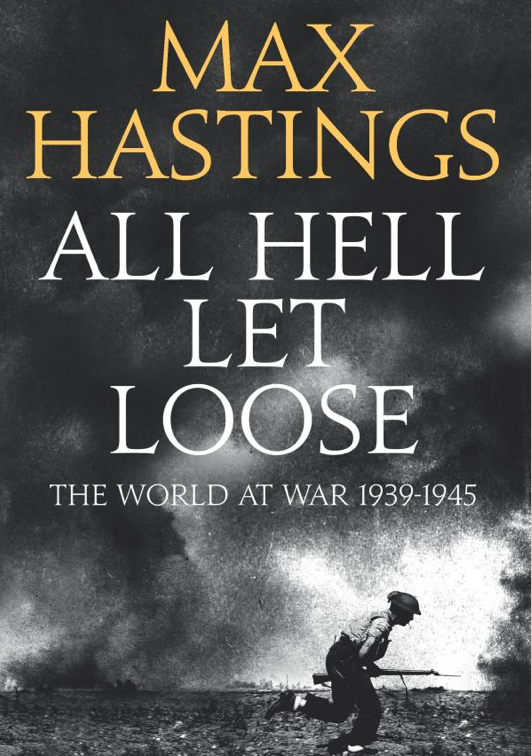
Max Hastings’ new book ‘All Hell Let Loose’ is a one volume history of the Second World War. It is also, for a variety of reasons, a tremendous achievement.
Anyone seriously interested in WW2 is already familiar with Hastings’ work. From ‘Bomber Command’ to ‘Overlord: D Day and the Battle for Normandy’, from ‘Armageddon: The Battle for Germany 1944-1945’ to ‘Nemesis: The Battle for Japan, 1944-45′, Hastings has chronicled the conflict with his particular gift for understanding both military strategy and personal experience.
But ‘All Hell Let Loose’ is his best book on the war to date – and given his previous track record that really is saying something. It’s an important work in part because of the simplicity of the central question at the core – ‘what was it like to be in this war?’ And in exploring this vital issue Hastings delivers all of the insight into the military experience you might expect from a master of this history.
I was particularly struck, for example, not only by the power of the testimony he has found from both the Eastern Front and the Western Allies’ march on Berlin, but also by the anecdotes from the less well covered theaters of the conflict. Recounting the humane treatment the German Afrika Korps often meted out to their captives, for instance, Hastings quotes the revealing testimony of an Australian, Private Butler. He recovered two wounded comrades from the Germans and these Aussies told him that, ‘The Germans had shot them and then went out at great personal risk, brought them in and dressed their wounds, gave them hot coffee and then sent for their medical assistance. Thank God there is chivalry.’
But perhaps my favourite insight from the many warriors quoted in the book comes from Spitfire pilot Geoff Wellum, who recalls thinking this as he closed for a kill during the Battle of Britain: ‘My target, concentrate, the target. Looking at him through the sight, getting larger much too quickly, concentrate, hold him steady, that’s it, hold it… be still my heart, be still. Sight on, still on, steady… fire NOW!’
However, even more impressive, and showing a compassionate side that not every military historian possesses, is the way Hastings tells the story of the war through the words of those who suffered. He reveals, for example, how Derek Lambert, a nine year old evacuee, ‘sobbed in awful desolation’ having been taken from his home. And how a nineteen year old Jewish refugee in Norway, Ruth Maier, thought of ‘the Germans more as a natural disaster than as a people…’. In one particularly poignant piece he quotes Gustave Folcher watching columns of refugees as he passed them by during the Battle for France: ‘The children look at us one by one as we overtake them, holding in their hands the little dog, the little cat or the cage of canaries they didn’t want to be separated from.’
Alongside this moving and eclectic mosaic of testimony, Hastings tells the wider story of the war with all of the penetration and brilliance that his many fans expect. Indeed, the necessity to be concise in this single volume history of the war – to try and explain the entire conflict in one readable book – has brought out some of Hastings best ever historical writing and analysis. Always sympathetic, always understanding, yet never sentimental, Hastings has written a monumental work.
In his conclusion he eschews glib and simple judgment, saying rather that the Second World War ‘was the greatest and most terrible event in human history. Within the vast compass of the struggle, some individuals scaled summits of courage and nobility, while others plumbed depths of evil, in a fashion that compels the awe of posterity.’ And whilst he feels that, ‘It is impossible to dignify the struggle as an unalloyed contest between good and evil’ he ends this wonderful book with this important reminder: ‘All that seems certain is that Allied victory saved the world from a much worse fate that would have followed the triumph of Germany and Japan. With this knowledge, seekers after virtue and truth must be content.’
 Twitter
Twitter





